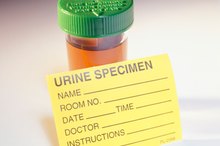Can Taking Too Many Antibiotics Cause Low Stomach Acid?
Antibiotics are prescribed for a variety of bacterial infections in every part of the body 2. Antibiotics are known to produce side effects in the intestines, causing concern that they have lowered the amount of acid in the stomach; however, that is not the problem. Instead, gastrointestinal distress results from a lack of good bacteria in the intestines 1. Some gastrointestinal conditions may also require treatment with antibiotics, which often are given with stomach acid reducers -- but generally they do not cause discomfort. Talk to your doctor about your medical symptoms and all the medicines you are taking.
About Stomach Acidity
The measure of the stomach’s pH is normally in the 1 to 3 range, meaning the acid is very concentrated. This is important for the digestive process, as the acid begins the breakdown of food. Whenever there is damage to the stomach lining, the acid may cause an ulcer, which may be difficult to cure. Ulcer is thought to be the result of a bacterium known as H. pylori, which may be treated with antibiotics. Stomach acid and contents may also reflux and flow backward into the esophagus, causing heartburn. Constant reflux may not only be painful, but may also cause esophageal ulcers or varices and require treatment with acid reducers and antibiotics.
- The measure of the stomach’s pH is normally in the 1 to 3 range, meaning the acid is very concentrated.
- Whenever there is damage to the stomach lining, the acid may cause an ulcer, which may be difficult to cure.
Antibiotics
What Over the Counter Medications Can Be Taken for Gastritis?
Learn More
Antibiotics taken for any type of infection may cause gastrointestinal problems such as cramping, bloating and diarrhea. This effect is not related to reduced stomach acid, but usually results because the antibiotics have killed off the good bacteria that are needed in the intestines. Antibiotic medications include amoxicillin, clarithromycin and metronidazole. Besides GI distress, amoxicillin may also cause allergic symptoms such as itching or swelling of the mouth and throat, which should be treated as an emergency. Metronidazole should not be taken with alcohol, as it may cause a serious reaction including headache, nausea and body pain. Tell your doctor immediately if you develop any of these symptoms.
- Antibiotics taken for any type of infection may cause gastrointestinal problems such as cramping, bloating and diarrhea.
- Besides GI distress, amoxicillin may also cause allergic symptoms such as itching or swelling of the mouth and throat, which should be treated as an emergency.
Stomach Acid Reducers
Medications such as antacids are used initially to treat heartburn. When they do not work, other medications may be considered. These include H2 antagonists such as famotidine, nizatidine, cimetidine and ranitidine. They work by preventing signals in the stomach that cause acid to be released. Another class of drugs, proton pump inhibitors (PPI), may also be used. These medications include omeprazole, esomeprazole, lansoprazole and others. They work by stopping the pumps that produce acid in the stomach. Although these drugs do cause reduced stomach acid, there are few side effects. They are often given in combination with antibiotics for short-term treatment or may be prescribed daily to prevent recurrence of the problem.
- Medications such as antacids are used initially to treat heartburn.
- These include H2 antagonists such as famotidine, nizatidine, cimetidine and ranitidine.
Probiotic Bacteria
Acid Stomach and Gas Causes
Learn More
Though acid-reducing medications do not cause significant side effects, antibiotics may kill off good bacteria needed in the intestines. Probiotic bacteria, such as lactobacillis and acidophilus species, may be taken to reduce side effects such as bloating, gas and diarrhea. Probiotic bacteria are present in products such as yogurt. If you are eating yogurt for the probiotic bacteria, make sure it states on the label that it contains live cultures. Probiotics may also be found as supplements in tablet or capsule form, which should be purchased from the refrigerated section of a health food store to ensure that you are getting live cultures.
- Though acid-reducing medications do not cause significant side effects, antibiotics may kill off good bacteria needed in the intestines.
- Probiotics may also be found as supplements in tablet or capsule form, which should be purchased from the refrigerated section of a health food store to ensure that you are getting live cultures.
Related Articles
References
- MedlinePlus: Gastroesophageal Reflux Disease
- "Prescription for Nutritional Healing"; Phyllis A. Balch, CNC; 2005
- National Institute of Diabetes and Digestive and Kidney Diseases. Symptoms & causes of GER & GERD. November 2014.
- National Institute of Diabetes and Digestive and Kidney Diseases. Diagnosis of GER & GERD. November 2014.
- Harvard Women's Health Watch. 9 ways to relieve acid reflux without medication. Harvard Health Publishing. September 10, 2019.
- US Food and Drug Administration. Over-the-counter (OTC) heartburn treatment. March 3, 2018.
Writer Bio
Melissa Lind holds a Bachelor of Science degree from the University of Texas College of Pharmacy. She has over 20 years experience as a health-care professional, including pharmacy practice as a registered pharmacist, and experience in clinical research management and community college instruction in pharmacology and health topics. Lind has been a freelance writer and independent content provider since 2006.





